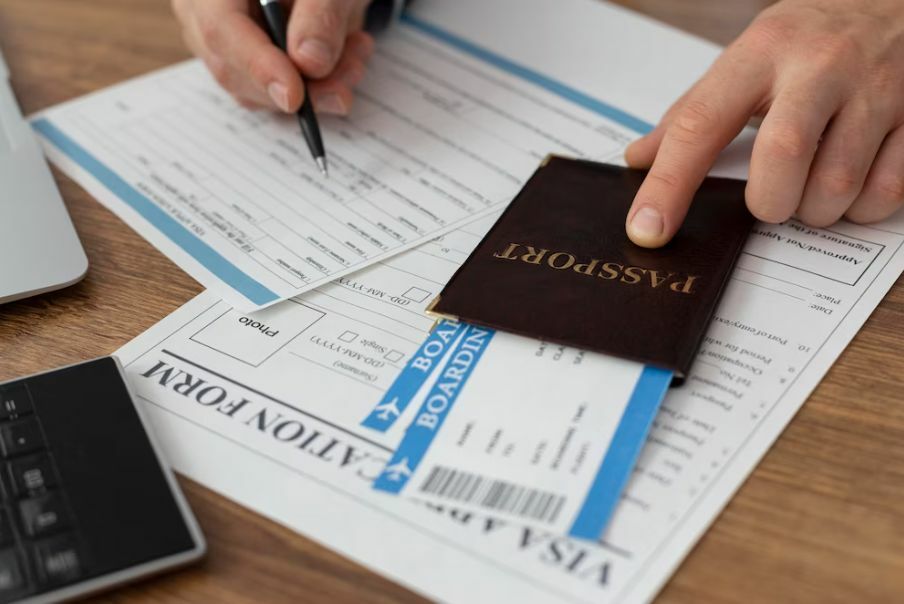Long Term Visa: Importance of Thailand’s 90-Day Reporting

The 90-day reporting is a requirement for foreigners staying in Thailand for an extended period of time. It is a process where non-Thai nationals need to report their current residential address and other personal information to the immigration authorities every 90 days. The 90-day reporting is mandatory for anyone who holds a long-term visa, such as a non-immigrant visa, retirement visa, marriage visa, or work permit. Failure to comply with the 90-day reporting can result in fines, deportation, or other legal consequences. Let us explore how can we seamlessly comply with Thailand’s rules and regulations and the possible consequences if we fail to do so.
How can I get my 90-day reporting done?
1. Online reporting

Visit the Thai Immigration Bureau website: Go to the official website of the Thai Immigration Bureau. If you are a first-time user, you will need to create an account by providing your personal information, such as your name, passport number, and email address. You will also need to create a username and password for future logins.
Once you have logged in to your account, you will need to fill out the 90-day reporting form. The form will ask for your personal information, visa details, and current address in Thailand. Make sure to double-check your information before submitting the form. After you have completed the form, click on the “Submit” button to send the report to the Thai Immigration Bureau. You will receive a confirmation receipt after your report has been submitted.
Everyone can check the status of your 90-day reporting by logging in to your account on the Thai Immigration Bureau website. And you will be able to see if your report has been processed and approved by the authorities.
2. In-person reporting

Before visiting the immigration office, make sure to gather all the required documents, including your passport, visa or work permit, departure card, and any other relevant documents. It is recommended to make copies of these documents in case they are requested. When you arrive at the immigration office, you will need to fill out the 90-day reporting form with your personal information, visa details, and current address in Thailand. Make sure to double-check your information before submitting the form.
After you have completed the form, submit it to the immigration officer along with your passport, departure card, and other relevant documents. The officer may ask you additional questions or request further documents, so be prepared to provide any necessary information. Once your 90-day reporting has been processed and approved, you will receive a receipt as proof of compliance. Make sure to keep this receipt in a safe place, as you may be asked to show it during future encounters with immigration officials.
3. Reporting by mail

Use the Thai Immigration Bureau website or other official sources to locate the address of the immigration office where you need to send your 90-day reporting. Make sure to verify the address and any specific instructions for mailing your report.
Before mailing your 90-day reporting, make sure to gather all the required documents, including your passport, visa or work permit, departure card, and any other relevant documents. Once you have completed the form, mail it along with your passport, departure card, and other relevant documents to the designated immigration office.
4. Agents

Using an agent can be a convenient option, as they can assist you with filling out the required forms, gathering the necessary documents, and submitting your report to the immigration office on your behalf.
However, it is important to choose a reputable agent or company to ensure that your 90-day reporting is handled correctly and in a timely manner. You should research the agent or company’s reputation and reviews before using their services, and make sure to clarify their fees and any other terms and conditions beforehand. It is also important to note that using an agent or company does not absolve you of your own responsibility to comply with the 90-day reporting requirement. Avoid penalties and immigration hassles! Ensure your 90-day reporting in Thailand is accurate, complete, and submitted on time.
What happens if I fail to submit my 90-day reporting on the long term visa?
If you fail to complete your 90-day reporting in Thailand of the long term visa, you may face various consequences depending on your immigration status and the duration of your overstay.
1. Fines and penalties

For long term visa, You may be subject to fines or penalties for failing to comply with the 90-day reporting requirement. The exact amount of the fine can vary depending on the duration of your overstay and other factors, but it can be as high as 2,000 baht per day.
Overstaying your visa in Thailand can be costly! The fines start at 500 baht per day for the first 90 days, then jump to 1,000 baht per day after that. The maximum fine is 20,000 baht, but that won’t guarantee you avoid jail time or deportation. Make sure you follow Thailand’s visa regulations to avoid a hefty fine and potential trouble.
It is important to note that the fines and penalties can vary depending on the individual case, and immigration officials have the discretion to impose additional penalties or take other actions depending on the severity of the violation.
2. Stay Difficulties

Failing to complete your 90-day reporting can also result in difficulties with future immigration processes, such as visa renewals or extensions. The Immigration officials may require you to complete your 90-day reporting before they process any further applications. If you fail to complete your 90-day reporting and overstay your visa, you may face difficulties in the future when you try to re-enter Thailand or apply for a new visa.
3. Reputation Damage

Failing to complete your 90-day reporting and overstaying your visa can also damage your reputation in Thailand and affect your ability to work or conduct business in the country. This could lead to difficulties in obtaining visas, licenses, or permits necessary for your business operations, and could harm your ability to attract customers, investors, or business partners in the country.
4. Serious legal action

In more serious cases, failing to comply with the 90-day reporting requirement can also result in deportation from Thailand. If you overstay your visa for more than 90 days, you may be subject to arrest, detention, banned from entering Thailand for a period of time or straight deportation from the country.
Don’t mess around with Thailand’s 90-day reporting! Failing to report can lead to serious consequences. Make complying a priority. You can report online, in person, through an agent, or even by mail. Just pick a method and get it done on time!
Common challenges and solutions for Thailand’s 90-day reporting
While Thailand’s 90-day reporting process is generally straightforward, there can be a few bumps along the road. Here are some common challenges you might encounter and solutions to keep your reporting smooth:
Website issues
- Problem: The Immigration Bureau website might be slow, down for maintenance, or malfunctioning during submission.
- Solution: Try submitting your report at different times of the day or night. Consider using a different browser or device. If the issue persists, contact the Immigration Bureau directly for alternative reporting options.
Missing documents
- Problem: You might realise you’re missing a required document close to the deadline.
- Solution: Gather all documents well in advance for your long term visa. If something is missing, act quickly. Request the document urgently or explore alternative ways to submit your report, such as using an agent who can help expedite the process.
Language barrier
- Problem: The reporting forms or website might be in Thai, causing difficulties for non-Thai speakers.
- Solution: Utilise online translation tools to understand the forms. Consider seeking help from a friend, translator, or agent if navigating the website or understanding instructions proves too complicated.
You can read more about step-by-step guide for 90-day reporting in Thailand and see how to have smooth 90-day report for long term visa to ensure you comply with the necessary rules and regulations.
Latest Thailand News
Follow The Thaiger on Google News:


























